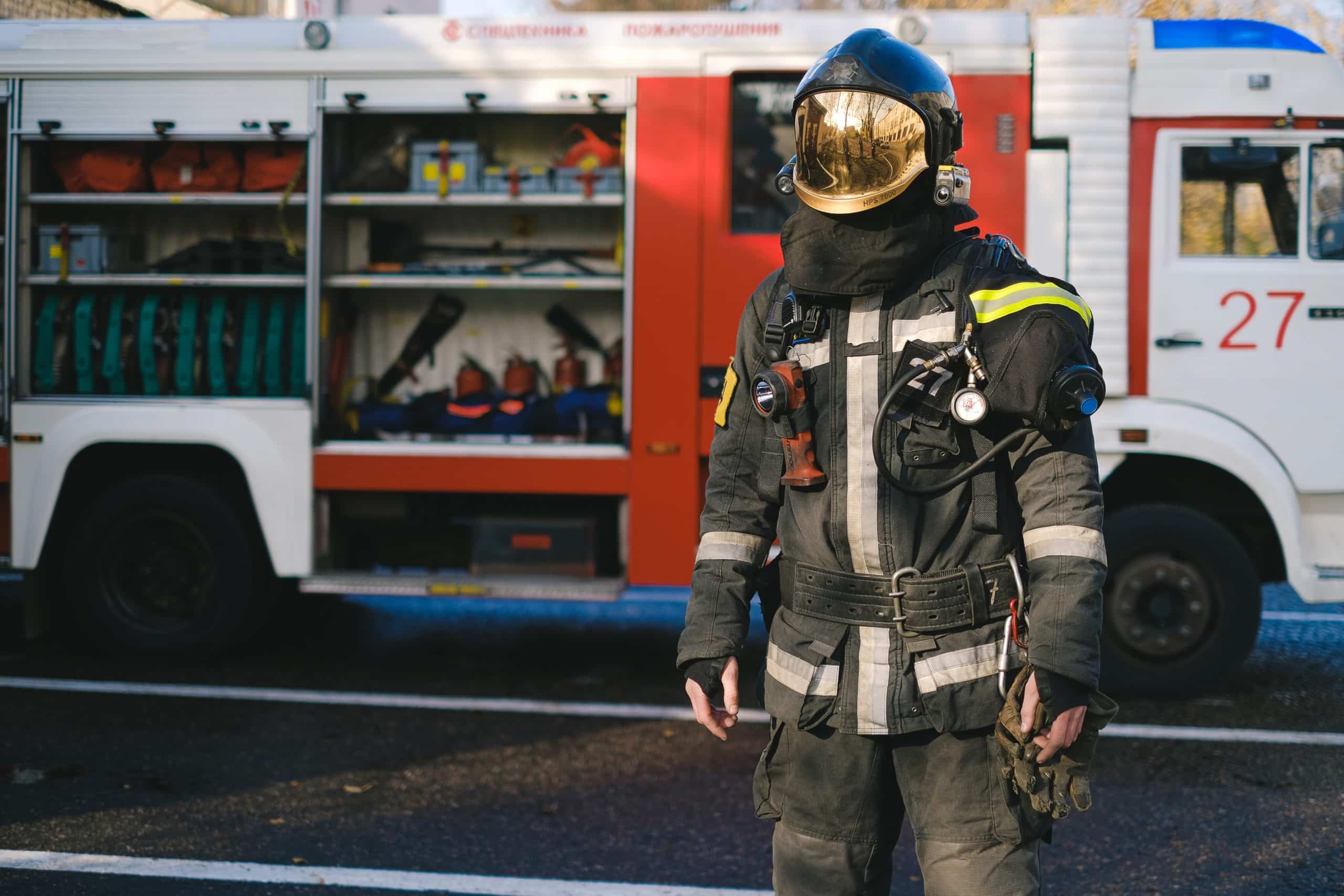Drug and Alcohol Abuse Among First Responders
Learn all about drug and alcohol abuse among first responders’ and treatment options.
Table of Contents
Who Are First Responders?
First responders are trained professionals who typically arrive first on any emergency or accident scene. Typical first responders include police officers, emergency medical technicians (EMTs), and firefighters. However, other professionals within the health and safety field can be trained as emergency response.
For example, police officers respond to emergency calls while they’re out on patrol of an area, and EMTs are trained to perform lifesaving techniques at the scene of an accident without the assistance of extensive hospital equipment.
The First Responder Mindset
The Homeland Security Act
The Homeland Security Act of 2002 defines a first responder as an individual who protects the life, evidence, property, or environment during the first stages of an emergency. Under this definition, firefighters, law enforcement, medical personnel, utility workers, and public health professionals all qualify as first responders. Some of the more common first responders include:
- Police officers
- Security guards
- FBI agents
- Sheriffs
- EMTs
- Firefighters
While they may have different titles, the duties of these first responder groups might be first aid, life support, mobilizing injured people for transport, and communicating with dispatchers and medical facilities about incoming patients. Because first responders are often the first at the scene of an emergency, they may be subject to incredibly stressful and traumatic situations.1 For this reason, first responders’ addiction treatment is critical and should be available to all first responders.
First Responders, Behavioral Health, and Drug Abuse
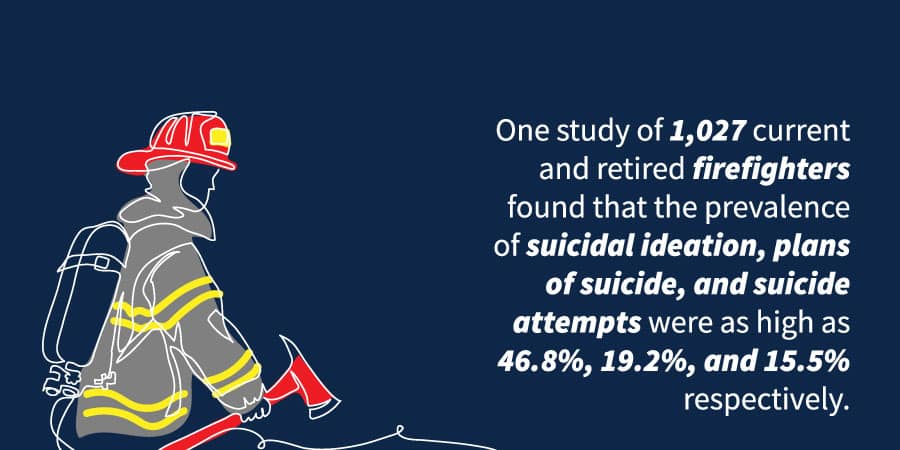
First responders are the first people on the scenes of challenging, dangerous, and draining emergencies. Their job is to protect the population’s health and make sure its national security is strong. First responders often witness or are exposed to death, grief, pain, loss, injury, threats to personal safety, long days of work, poor sleep, physical hardships, and other negative experiences.2
First responders have a difficult job in that they’re constantly exposed to disasters and traumatic events. Over time, the compounded experience of encountering disasters can take a toll on mental health that can lead to substance abuse disorders. Because of the stress of their jobs, behavioral health problems and substance abuse are commonly seen among this population. They should be treated with first responder counseling or first responders’ addiction treatment.
EMTs, Behavioral Health, and Drug Abuse
A huge risk factor for first responders is the sheer pace of their work. Because an emergency or accident can happen at any time, emergency medical services personnel have to be on call and ready to respond. In fact, one study found that nearly 69% of all emergency medical services professionals never had enough time between the traumatic events they witnessed during their line of work. As a result, stress, post-traumatic stress disorder, suicidal ideations, depression, and substance use disorders have been reported.2
Depression is a common condition reported by first responders. In fact, one study found that about 6.8% of EMS and EMT workers were diagnosed with depression. Further, stress and post-traumatic stress symptoms are commonly seen. As for suicidal ideations, there isn’t much literature that looks into symptoms of suicide.3 However, some findings have shown a lifetime prevalence of 28% of emergency medical services professionals feeling as though their life is not worth living.4
Substance abuse disorders are prevalent among EMTs. In one study, it was found that nearly 40% of all EMTs and paramedics had experienced problems with alcohol and drug addictions.5 Because this prevalence is so high, first responder treatment is an important resource that everyone should access.
Firefighters, Behavioral Health, and Drug Abuse
Firefighters are often subjected to painful experiences, crazy sleep schedules, and other factors that can negatively affect their mental health. Further, some firefighters may experience stigma and may not seek counseling. Additionally, volunteer firefighters may even have more barriers to receiving first responders’ addiction treatment than career firefighters because of the cost and availability of first responder treatment.
First responder statistics state that the prevalence of depression among firefighters is anywhere between 13% and about 17%. This study also found that volunteer firefighters had a higher rate of depression than career firefighters. Yet another study found the prevalence of depression to be as high as 38.5% in female volunteer firefighters and 22.2% in female career firefighters.6
The Strain on Firefighters
Firefighters have reported post-traumatic stress disorder and stress symptoms. According to a recent literature review, over 50% of all firefighter deaths are due to stress and exhaustion. Suicidal ideations are also reported in firefighters at a much higher rate than the general population. While the research in this area is limited, current studies indicate that firefighters report higher numbers of attempts and suicidal ideation rates. In fact, one study of 1,027 current and retired firefighters found that the prevalence of suicidal ideation, plans of suicide, and suicide attempts were as high as 46.8%, 19.2%, and 15.5%, respectively.6
Substance abuse disorders and addiction are commonly reported in firefighters. Heavy binge drinking is reported in about 50% of all male firefighters, 83.3% of all professional female firefighters have reported trying smoking, and 22% currently smoke.7 Because substance use disorders and addiction are prevalent among this population, first responders’ addiction treatment is crucial.
Police Officers, Behavioral Health, and Drug Abuse
Police officers commonly encounter dangerous situations and are more likely to experience hazardous events, traumatic events and find themselves in critical incidents. For instance, one study found that 75% of surveyed police officers reported experiencing at least one traumatic event. However, less than 50% of those who had experienced a traumatic event reported that incident to their supervisors.8
The Strain on Police Officers
Depression and post-traumatic stress disorders are commonly reported in police officers. In studies that have looked at mental health in police officers following traumatic events, such as the 9/11 attacks and Hurricane Katrina, researchers found considerable spikes in depression and anxiety. Reviews of the literature that studies suicidal ideations in police officers show that about 25% of female officers and 23.1% of male officers have thought about suicide.9
Substance abuse disorders in police officers have been reported. In a study that looked at the average number of alcoholic drinks after Hurricane Katrina, researchers found that police officers drank about two drinks per day before hurricane relief efforts. Still, the number of drinks per day went up to about seven drinks afterward.10
PTSD and Substance Abuse in First Responders
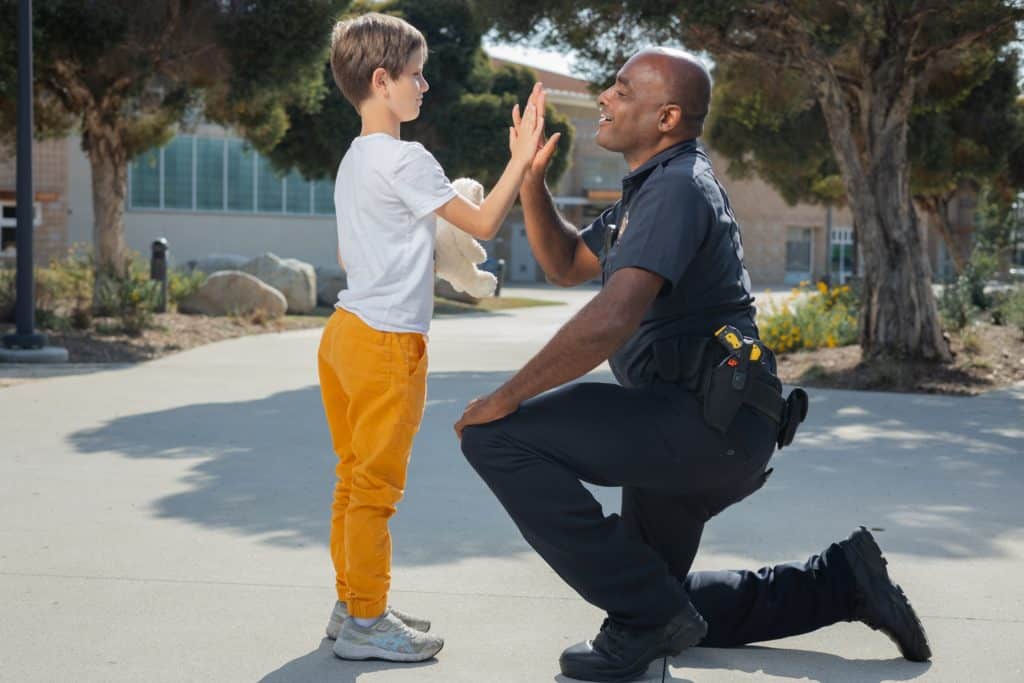
Post-traumatic stress disorder, commonly known as PTSD, is commonly seen in first responders. First responders’ addiction treatment can help individuals with PTSD overcome their substance abuse disorder and identify triggers that can help them manage their PTSD symptoms. Some of the common signs of PTSD in first responders are discussed below.
Intrusive Memories
Intrusive thoughts or intrusive memories are repeated and involuntary memories that cause distress within the individual. These memories can appear as dreams or flashbacks of the traumatic event they experienced. When these intrusive memories occur, they can be so vivid that the individual may feel as though they’re experiencing that traumatic event repeatedly.11
Avoidance
Another common sign of PTSD symptoms is avoidance. When an individual experiences a traumatic event, they may avoid any reminders of that traumatic event. These reminders can be places, people, activities, objects, or situations that commonly trigger distressing memories. Further, people may even avoid remembering or thinking about that traumatic event and will resist talking about it to friends, family, and even mental health professionals.11
Negative Changes in Thinking and Mood
Changes in cognition and mood are other common symptoms of PTSD. These negative thoughts and feelings can lead to distorted beliefs and thoughts about oneself and severe mental health implications. Those with PTSD may feel guilt, anger, horror, fear, or shame. These negative feelings can affect an individual’s personality and how they interact with others. So, these negative changes in thinking and mood impact the individual and have negative consequences for the people around them.11
Changes in Physical and Emotional Reactions
First responders with PTSD may also experience changes in physical and emotional reactions. They may feel more irritable, have angry outbursts, and start behaving recklessly or self-destructively. These signs and symptoms can be difficult for loved ones to watch, so engaging in first responders’ addiction treatment and PTSD programs are essential.11
Signs of Substance Abuse in First Responders
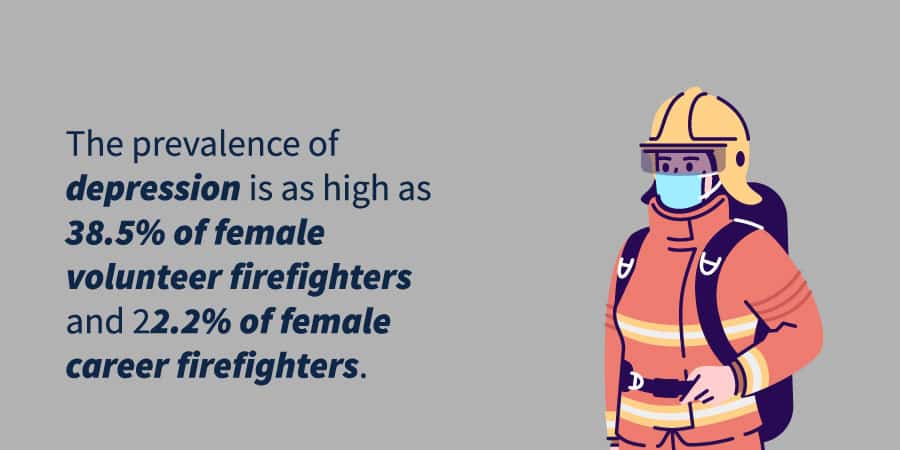
The first step in first responders’ addiction treatment is recognizing the signs of substance abuse. First responders’ mental health is constantly compromised, and it’s important to acknowledge the science of alcohol abuse or substance use. There are generally physical, mental, and behavioral warning signs of substance use disorder that first responders and their loved ones should be on the lookout for.
Health Problems
Health problems may or may not be noticeable at first, but they can impact the individual internally. Some health problems may be more severe, but others may be as common as bloodshot eyes. Some of the common health problems or physical signs of substance use disorder include:
- Bloodshot eyes or pupils that are larger or smaller than they usually are.
- Changes in appetite.
- Changes in sleeping patterns.
- Runny nose or constant sniffling.
- Sudden weight loss or sudden weight gain.
- Unpleasant odors coming from the breath, body, or clothing.
- Tremors, slurred speech, or impaired coordination.12
Changes in Appearance
Changes in appearance can be alarming. However, keep in mind that changes in appearance can be slight as not showering but as dramatic as weight gain or weight loss. There are a couple of different categories of changes in appearance, including physical wellbeing and overall changes in physical health. For example, consistent substance abuse can lead to sudden changes in weight and sleep patterns, making an individual look dramatically different.12
Drug Paraphernalia
One of the more obvious signs of substance abuse is the presence of drug paraphernalia. Depending on the substance of choice, drug paraphernalia can be aerosol cans, needles, bottles, or cans containing alcohol, or smoking materials. Additionally, those suffering from substance abuse disorders often will go out of their way to obtain their drug of choice. Loved ones may notice that the individual begins to obsess over getting the substance and may constantly think about using, figuring out how to get more, or recovering from using their substance.12
Memory Loss
Memory loss is a common psychological warning sign of substance use disorders. Along with other psychological warning signs, such as sudden mood swings, increased irritability, changes in personality, lack of motivation, and increased feelings of anxiety or paranoia, memory loss can occur from using too much of a substance. For example, an individual who consistently consumes alcohol may experience a blackout and may not remember activities that had happened when they were drinking.12
Withdrawal from Social Activities
One of the most common behavioral or social symptoms of substance use disorder is a withdrawal from social activities. If someone who often goes out with friends or attends social events all of a sudden stops going to those events, that should be a red flag. Even further, behavioral symptoms can impact personal relationships and isolate that individual from loved ones.
The withdrawal from social activities can be difficult for loved ones to deal with. Watching someone go from constantly being around to completely changing their habits can be challenging to deal with. If any of the below signs are suspected, it may be time to find first responder mental health programs. Some of the social and behavioral warning signs of substance use disorders that should be watched for include:
- Neglecting responsibilities at work, home, school.
- Sudden changes in friends, favorite spots to hang out, and favorite hobbies.
- Life begins to revolve around the use of the drug.
- The individual abandons enjoyable activities that they used to participate in.
- Suddenly getting into fights, accidents, illegal activities, or driving under the influence.12
What Does It Take to be a First Responder?
How to Help a First Responder Battling Substance Abuse or PTSD
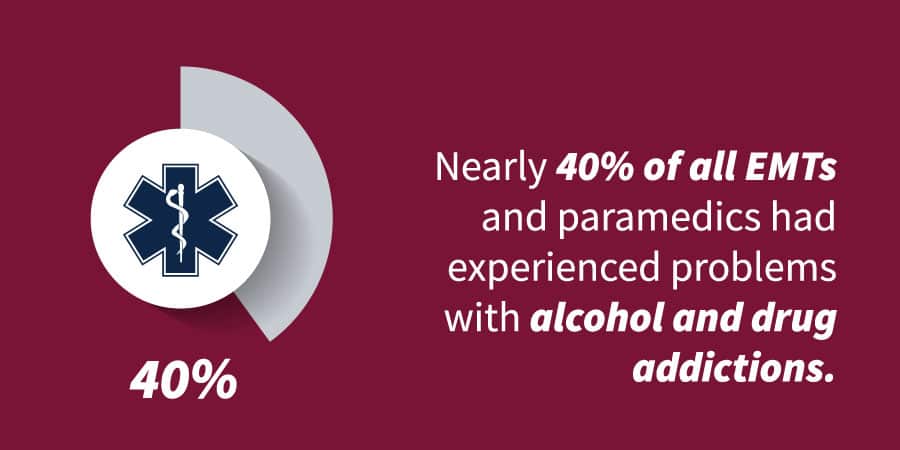
Seeking help is the first step in first responders’ addiction treatment. Recovery first rehab cannot be done unless the individual finds a first responder treatment program that works for them. However, there may be some barriers to getting treatment for addiction among first responders. Some of these barriers are due to stigma, but other barriers may include:
- Lack of knowledge of how to find first responder PTSD treatment programs.
- Having a lack of access to first responders’ addiction treatment.
- Not wanting to admit a “weakness.”
- Negative experience of recovery first rehab in the past.
- Being seen as a burden to one’s family.
- Worrying that confidentiality will be broken during first responder’s addiction treatment.13
Many programs help treat PTSD and substance use disorders. Whether a first responder is looking for an inpatient program, outpatient program, or support groups, mental health professionals and addiction treatment programs can provide the resources and therapy needed to help the individual better cope with their stress.
Talk It Out
While it may be difficult for some, having a mental health professional to talk to about substance abuse and stress at work can be helpful. Talk therapy, such as solution-focused therapy, dialectical behavioral therapy, and cognitive-behavioral therapy are all evidence-based therapies that can help promote better psychological wellbeing.
Encourage
If you suspect that your loved one may be dealing with a substance use disorder or addiction, it may be best to encourage them to seek first responder treatment. First responder PTSD treatment programs and first responder mental health programs are the best resources and programs to help your loved one heal from their trauma and addiction.
Participate
Participating in therapy is the only way for therapeutic services to work. If an individual attends a therapy session without working with a therapist or loved ones to work on themselves, they won’t heal. Instead, make sure to participate in therapy actively and be open and honest with the course of treatment.
Seek Professional Help for First Responders Near Me
Seeking professional help for substance abuse or addiction is in an individual’s best interest if they’re experiencing negative impacts of substance abuse disorders. There are many different options and programs available for first responders’ and reaching out for help can make all the difference. Mental health professionals are trained to work with those who suffer from addiction and help them develop better coping skills in the face of trauma and negative experiences.
Resources
- https://learn.org/articles/First_Responder_Job_Duties_Occupational_Outlook_and_Education_Requirements.html
- https://www.samhsa.gov/sites/default/files/dtac/supplementalresearchbulletin-firstresponders-may2018.pdf
- https://www.tandfonline.com/doi/full/10.3109/10903127.2012.761307
- https://doi.org/10.1016/j. cpr.2015.12.002
- https://www.ninthbrain.com/resources/firefighters-ems-workers-and-substance-abuse-disorder/#:~:text=Roughly%2080%2D100%25%20of%20all,problems%20with%20drugs%20and%20alcohol
- https://www.sciencedirect.com/science/article/abs/pii/S0165178116311325?via%3Dihub
- https://bmcwomenshealth.biomedcentral.com/articles/10.1186/1472-6874-12-39
- https://www.tandfonline.com/doi/full/10.1080/10439463.2016.1234469
- https://www.sciencedirect.com/science/article/abs/pii/S0272735815300684?via%3Dihub
- https://onlinelibrary.wiley.com/doi/10.1002/smi.2615
- https://www.psychiatry.org/patients-families/ptsd/what-is-ptsd
- https://www.ihs.gov/asap/familyfriends/warningsignsdrug/
- https://journals.sagepub.com/doi/full/10.1177/1078390319871997


